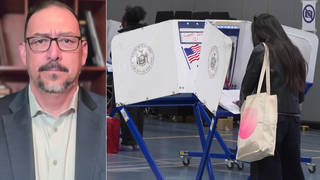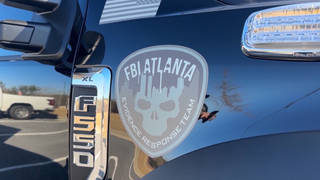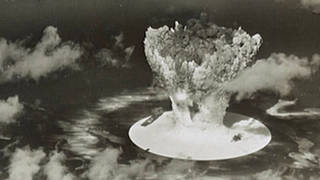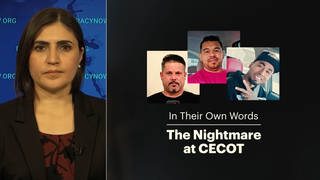
Guests
- Noah Bullockexecutive director of Cristosal.
- Juan PappierAmericas deputy director at Human Rights Watch.
Two hundred fifty-two Venezuelan immigrants in the United States were flown to El Salvador in the dead of night and indefinitely imprisoned at the Salvadoran mega-prison CECOT, the Terrorism Confinement Center. The detainees had no ability to communicate to the outside world before they were finally released to Venezuela in a prisoner exchange. The men were “subjected to beatings almost daily upon arrival,” says Noah Bullock, executive director of Cristosal, who co-authored a report with Human Rights Watch documenting human rights abuses and torture in the prison.
The report also found that the prison guards were “clearly trying to hide their identities while they were torturing these Venezuelan migrants,” says Juan Pappier, Americas deputy director at Human Rights Watch.
Transcript
AMY GOODMAN: This is Democracy Now!, democracynow.org. I’m Amy Goodman, with Juan González.
“The nightmare began the moment they took me off the plane.” Those are the words of 26-year-old Gonzalo, one of 252 Venezuelan immigrants in the U.S. who were flown to El Salvador earlier this year in the dead of night and indefinitely imprisoned at the Salvadoran mega-prison CECOT, the Terrorism Confinement Center. The detainees endured about four months of confinement and abuse, with no ability to communicate with the outside world. They were finally released to Venezuela in a prisoner exchange in July.
A new report, based on interviews with 40 of the men and 150 others with credible knowledge of their confinement, has just been released by Human Rights Watch and Cristosal, a human rights organization that works across El Salvador and Central America. The report is headlined “’You’ve Arrived in Hell’: Torture and Other Abuses Against Venezuelans in El Salvador’s Mega Prison.”
We’re joined now by co-authors Juan Pappier, Americas deputy director at Human Rights Watch, as well as Noah Bullock, the executive director of Cristosal. They’re both joining us in Washington, D.C.
Noah, let’s start with you. What did you find? Why were these men sent to the mega-prison CECOT? And what happened to them?
NOAH BULLOCK: Hi, Amy. And thank you for the coverage, yeah.
I think your question is the same question that those men asked when they found themselves in CECOT, wondering what they were doing there. About 252 Venezuelans were sent to the Salvadoran prison, the Terrorist Confinement Center, CECOT, without any due process. No judges convicted them of anything. And they were sent to be imprisoned indefinitely in a place, in a prison system where we know the human rights violations have been systematic.
What we found in the report are also more about the profiles of who these people were. The idea that they were sent to this prison was predicated on the use of War Powers Act, the Alien Enemies Act, and the idea that these people were national security threats to the American people. But in our report, that allegation is unfounded.
We used public information requests to get access to criminal background checks, both in the United States and countries of transit. We also used a FOIA request to get access to information about their immigration status.
These people were migrants. Nineteen of them had suffered persecution directly in Venezuela before they left the country, and 65 of them of the 130 that we were able to investigate were in the United States and had open asylum claims pending when they were forcibly removed. These people were migrants seeking protection. They weren’t terrorists or security threats to the United States.
JUAN GONZÁLEZ: And what were some of — Noah, what were some of the abuses that they sustained? Could you give some details?
NOAH BULLOCK: Sure. This report, for us, our organization has been documenting torture and killings in Salvadoran prisons in the last four years almost, under a state of emergency that’s been in place in El Salvador. And so, what we saw in this report is the continuation of similar patterns.
One of the conclusions we make is that torture is institutionalized in Salvadoran prisons. It’s a state policy. It’s almost as if the prison guards operate on a protocol. It’s impossible that this is the actions of bad guards or bad apples. People were subjected to beatings almost daily.
Upon arrival, they were beaten. When they asked for food and water, they were beaten. When they asked for medical care, on the way to the clinic, they were beaten. They were often denied food, water, clothing, basic hygiene as a tool of punishment or reprisals.
And in the case of the report, we also showed how the Venezuelans resisted and protested the beatings, but then were subjected again to more beatings. There was a punishment cell called “the Island” in their module, where — a tiny space, a solitary confinement cell, where they were taken and beaten regularly. They would be deprived for hours of food and water, or in some cases, days. And even, sadly, we documented cases of sexual abuse.
And it’s important to note that the testimonies were consistent across 40 different individuals who gave testimonies. We were able to document and corroborate their testimonies with photographic evidence that was assessed by independent forensic experts.
JUAN GONZÁLEZ: And, Juan Pappier, these guards at times wore hoods and took videos and photos of the beatings that they were exacting on their prisoners?
JUAN PAPPIER: Yes, we were able to document, based on the interviews with these detainees, that the guards wore hoods. They didn’t share their names; they used aliases. They were clearly trying to hide their identities while they were torturing these Venezuelan migrants, who, in many cases, fled the dictatorship of Maduro in Venezuela, came to the United States seeking asylum, seeking protection, and ended up in a prison, in a mega-prison in El Salvador, where they were brutally tortured.
AMY GOODMAN: I’m wondering, Noah Bullock, if you can talk more about the secretive nature of CECOT, how there is practically no access to the facility. And this question: Are any people, Venezuelan or others, sent from the United States still there? And, of course, how many Salvadorans are there, and what happens to them?
NOAH BULLOCK: That’s right, Amy. The Salvadoran prison system has been under a state of emergency for almost four years. And in that state of emergency, families, defense lawyers have no access to the prisons. There’s no public information about who is being held in the Salvadoran prison system.
Our organization made a public information request in El Salvador to determine the identities officially of the Venezuelans and Salvadorans that were sent to the CECOT. That request was denied. We also presented 76 different habeas corpus claims with Venezuelan families to try and confirm their whereabouts and their identities. Also, those claims were not responded to by the Salvadoran court.
So, in a sense, these people were sent to a judicial black hole. They were disappeared, with no access to their families. The CECOT itself is a prison where, up to this point, nobody has left. In fact, that’s one of the novelties of this report that we’re publishing today, is it’s the most complete information that we have of conditions inside CECOT, as these are the first individuals who have ever left.
Amy, it’s important to remember that the Venezuelans were constantly threatened and reminded that they would never leave CECOT alive. It’s a prison that was created not as a place where people serve sentences after due process and convictions, rather a place where people are sent for permanent punishment and separation. There was a group of family members, Venezuelans, who came to El Salvador to attempt to visit them, to activate different institutions in the state of El Salvador to be able to find access, and they were all denied. This is a prison system that operates in the shadows and outside of rule of law.
AMY GOODMAN: We want to thank you so much for being with us, Noah Bullock, executive director of Cristosal, human rights organization working across Salvador and Central America. Cristosal co-authored this new report with Human Rights Watch titled “’You’ve Arrived in Hell’: Torture and Other Abuses Against Venezuelans in El Salvador’s Mega Prison.” And we want to thank Juan Pappier, the Americas deputy director at Human Rights Watch, which just published this report, that we’ll link to at democracynow.org.













Media Options